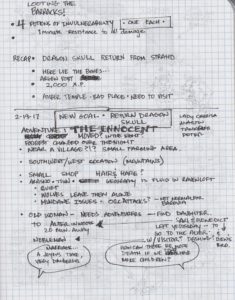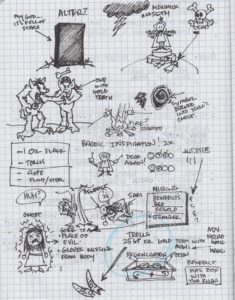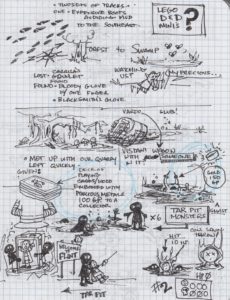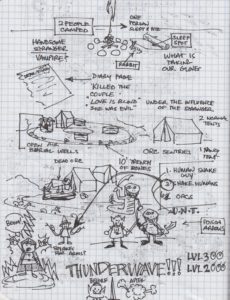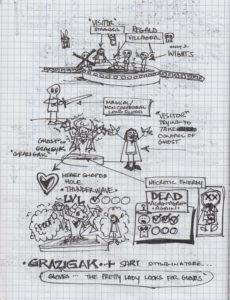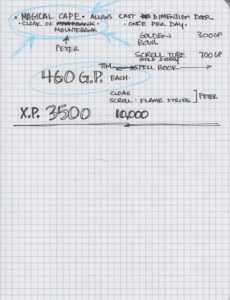Role playing games are basically choose your own adventure stories in which everyone gets to decide the path the story goes. They range in complexity and are usually set in a Fantasy, or Science Fiction world. Think about it, being a level 14 elementary school teacher might be adventurous, but after a while grading papers for nights on end can get a bit boring.
Dungeon & Dragons is the grandfather of them all (I’m sure someone will argue the point, but for me it was a great starting place, and still is). Based on a fantasy world in which magic is in the air and mythical creatures exist. Just watch the beginning of Disney’s “Onward” from 2020- just watch out for gelatinous cubes. 2023 will bring a new live action film which looks rather good – “Honor Among Thieves” as of this writing all we have are trailers, so- Caveat Emptor.
Starting out:
What do you want to be? You pick your character, the person running the game “The Dungeon Master” also known as “Game Master” also known as “Jeff” or in your case ‘Uncle Bruce” is more of a narrator and rules arbitrator. They set the world before you and adjust to what the group decides, guiding them through the story to hopefully a happy ending.
Do you want to be an elf or a dwarf? Do you want to swing a sword or throw lightning bolts? When you create a character there are pros and cons to every choice.
Character Creation Basics:
Attributes:
Strength- How strong you are
Dexterity- How fast you are, how accurate you are when hitting something
Intelligence- How smart you is
Wisdom- How wise you are- can you be fooled?
Constitution- Health, How much damage can you take?
Charisma- How people see you- Are you a pretty boy? Are you someone people fear? Do people naturally trust you?
Races/Species:
Each race/species has their own pros & cons. One thing to always consider is what are the disadvantages and how big are they. For example: I have learned that for me having a character that has “darkvision” is better than carrying a torch around. Torches tend to be like bright targets to dungeon dwelling monsters.
The basics are:
Humans- Just your average “Joe” or “Josephine” +1 to all ability scores, no darkvision
Halflings (Hobbits) – Short, furry feet no darkvision +2 Dexterity, Lucky (reroll 1’s
Lightfoot – +1 Charisma, Stealthy
Stout – +1 Constitution, advantage vs. Poison
Dwarves – Like mining and beards. Darkvision advantage against poison
Hill Dwarf- +1 Wisdom
Mountain Dwarf +2 Strength
Elves – can be rather full of themselves Darkvision, +2 Dexterity
High Elf- +1 Intelligence, Wizard Cantrip
Wood Elf- +1 Wisdom
Drow- +1 Charisma, Superior Darkvision, disadvantages to sunlight usually seen as evil- c’mon they worship a giant spider goddess
Lesser known: which means the DM can say “no” or make it really weird every time you need to go into a town. “The townspeople shutter their windows as the Dragonborn walks by…” “The priest at the local temple gathers a mob to drive the Tiefling out of town before evil descends and destroys this season’s harvest” “There’s something weird about the way people look at you.”
Gnomes – +2 Intelligence, Darkvision, advantage on INT WIS & CHA saves vs. magic
Forest Gnome +1 Dexterity, minor illusion cantrip, talk to animals
Rock Gnome- +1 Constitution Tinker
Dragonborn – Don’t ask me how, but half dragon half human +2 strength, +1 Charisma
Draconic Ancestry breath weapon varies
Tieflings – demons get around =1 intelligence, +2 Charisma, darkvision, Thaumaturgy cantrip Hellish rebuke spell, darkness spell at 5th level
Half Elf – Elves slumming it +2 Charisma, +1 two other scores, darkvision, advantage vs. charmed and sleep magic
Half Orc – Orcs meet up with humans who are into bad boys & girls- you know the ones trying to rebel against their parent’s authority +2 Strength, +1 Constitution, darkvision, extra damage on a critical hit
Character Classes:
What is you job/profession? What are you doing adventuring around?
The basic character classes are:
Fighter – hits things with a sword
Magic-User – when in doubt, cast a fireball at things.
Cleric – OMG! Help me! Usually uses the divine to help and support characters.
Rogue – Where’s my wallet? Hides, and picks locks.
There are others, but these are pretty much the root of all characters each has their pros and cons and in the old school D&D subclasses:
Fighter: Strength or Dexterity, Constitution or Intelligence (if you want to cast spells)
Barbarian: Fighter with anger management issues Strength, Constitution
Paladin: Fighter + Cleric (Holier than thou attitude) Strength, Charisma
Monk: “everybody was Kung-Fu fighting” Dexterity, Wisdom
Ranger: Fighter + Druid Dexterity, Wisdom Think Robin Hood
Magic-User:
Wizard: Knowledge is POWER Intelligence, Constitution or Dexterity
Sorcerer: I was just born this way Charisma, Constitution
Warlock: Power from a devil or Demon. Charisma, Constitution
Cleric: Wisdom, Strength or Constitution
Druid: Wisdom, Constitution
Rogue: Thief, spy, con artist Dexterity, Intelligence or Charisma
Bard: A little bit from column a and a bit from column b. Charisma, Dexterity
Check to see when things happen for each class- When do you get certain powers and abilities far beyond those of mortal men? Each class will have a point where you can increase an ability score- this would be when (if you wanted to) exchange this for adding a feat.
“I think your Alignment might be off.”
Every fandom has their version of Alignments. I agree with one of my old DM’s who had one rule- we do not play evil characters because that is who we are fighting against. To put it simply these are the Alignments. I have found that while it is fun to play something that isn’t “you” it is harder than you think, since your own morals tend to get mixed up in how to react to situations. For this I tend to play either Lawful Good or Chaotic Good which is determined by my characters background.
The Naming of Names
The last thing you should do after rolling everything out and figuring out who your character is would be to give it a name. I have found that this can be the window into the player’s soul. If you are serious you create some fanciful name that fits within the world. You may just name it after a character from a story. How many fighters are named after Arthurian knights, or Conan the Barbarian? How many wizards are named “Gandalf” or something similar? How many elves are named “Elrond” or Halflings named “Frodo”? The name should be meaningful for you and who cares what other people think? As you will see, I’m a little silly when it comes to my naming of characters, because that’s the way I play. I don’t take the game or my character too seriously.
Over complicating things at the start…
There are a few things that are listed as optional or at the “DM’s discretion” sometimes these are little things that aren’t a big deal, just understand that while your character can be used in another game, another DM may not have the same open-mindedness that another one has. Also keep in mind that everyone has a different level of experience or even access to materials. When I am playing with a new group, I always start with a simple straightforward character out of the Player’s Handbook. I don’t add anything outside of the basic rules. I figure until I know the group, this is the best. I chuckle when a new player who has just finished rolling out their character sits next to someone who starts off with, “My character is a Warforged.” Which is from a book that the DM and the player might have access to, but no one else. Then they announce that they are an Artificer, that class is from a different book, so now instead of a world inhabited by elves, dwarves and humans, we now have droids with blasters…
What happens after your first adventure?
Good question. For a lot of people that is the time where they need to decide if they like the character they have and want to continue or if they want to try something else. Sometimes, after one adventure, a player will realize that they like what another player’s character was doing and will want to start new. Sometimes, one adventure automatically leads into another – hence the chance to have an EPIC campaign rivaling the Odyssey or Le Mort D’Arthur or Game of Thrones or Toy Story.
The Awesomeness of Third Level-
Most character classes require you to make some choice at third level. The idea is that you have a basic knowledge of how the game functions so now you can customize your character to better meet whatever your vision may be. By this time if you have not come up with a backstory, you may want to since it helps in roleplaying. You should look at what those options are and maybe start steering your character that way from the beginning.
Uncle Bruce’s Role Playing Evolution:
I started off playing a Lawful Evil assassin (Thief subclass) and basically did everything that in real life I would never do. The Marquis de Iblis served me well through many adventures throughout high school.
In college I played a magic user who carried a katana. We used the Middle Earth Role Playing System based on ICE. He was pretty much a bait and switch character. You saw this vagabond on the road, thinking he was a down and out fighter and then from out of nowhere you got hit with a lightning bolt. Greyf was actually used by my DM at home to confuse his hone group during one of their adventures.
I returned to D&D playing a rogue in a few games (Cecil), a Wizard in a few games (Bibbiti Bobbiti Boo) a Barbarian in one game (Oogachucka) finally settling on a series of Bards (Lennon McCartney, Simon Garnetfunkel, Peter Paulenmary, and now Arlo) to me the bard is the most versatile of the classes allowing you to heal, cast spells, and fight. The Bard College you choose at third level helps to refine what direction you want your character to go.


